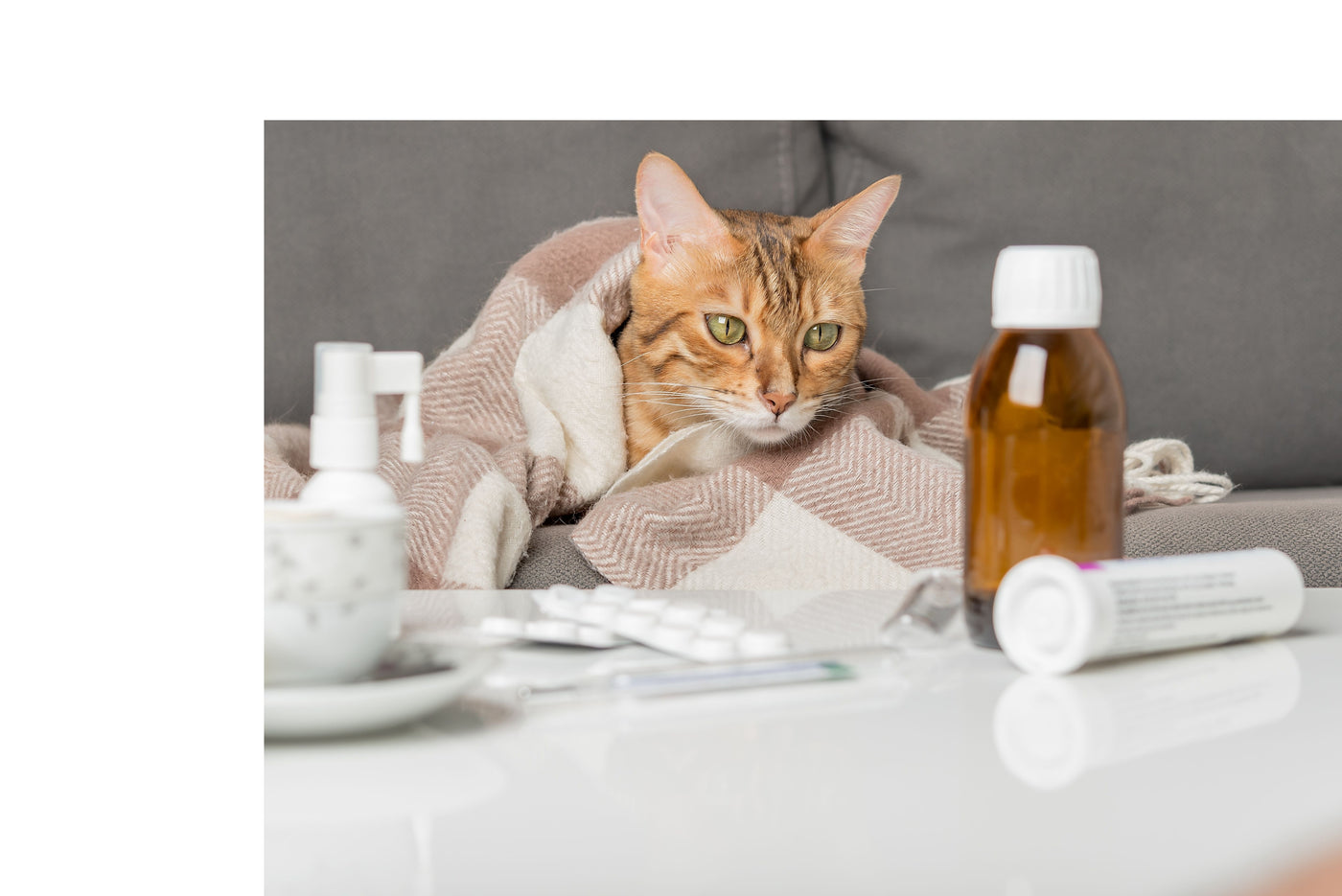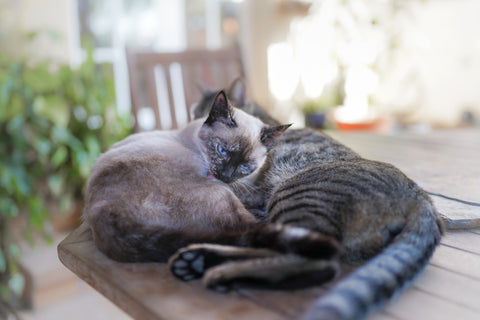
What causes kennel cough in cats? Continue reading to find out what kennel cough is, if it's common in cats, how to prevent your beloved furry friend from getting it, and how it is diagnosed and treated by veterinarians.
What Is Kennel Cough?
Kennel cough can be a combination of bacteria and viruses, but is most commonly caused by bacteria called Bordetella bronchiseptica. Kennel cough is also known as infectious tracheobronchitis, a term that reflects the nature of the condition as an infection of the upper throat and upper respiratory tract. Kennel cough is typically more prevalent in dogs than in cats.
Can Cats Get Kennel Cough?
Yes, cats can get kennel cough; however, it is considered rare for adult cats to contract the disease. Kennel cough can become a serious condition in kittens, senior cats, and cats with weakened immune systems.
Main Causes Of Kennel Cough In Cats
Cats infected with Bordetella bronchiseptica can spread kennel cough to other healthy cats, but this tends to only occur in places where many animals are kept together, such as in animal shelters. The bacteria is spread via nasal and oral secretions from coughing or sneezing, direct contact, and shared objects that become contaminated.

When a cat’s immune system is compromised, they can be more vulnerable and susceptible to infectious diseases. Stress, poor ventilation, and even smoke exposure can weaken a cat’s immune system.
Can Cats Catch Kennel Cough From Dogs?
No, cats don’t tend to catch kennel cough from dogs, and cats are typically more resistant to the disease than dogs. However, cats can be affected by common viruses, which may sometimes be confused with kennel cough (since symptoms can often present similarly).

Common Symptoms of Kennel Cough
In young kittens, kennel cough can cause severe and even fatal respiratory infections. Symptoms associated with kennel cough include:
- Coughing (typically raspy and dry)
- Sneezing
- Nasal discharge
- Eye discharge
- Conjunctivitis
- Fever
- Loss of appetite
- Trouble breathing

Diagnosis and Treatment of Kennel Cough
If your cat is experiencing coughing or other respiratory symptoms, it is always best to take them to your veterinarian so that they can properly diagnose and properly treat your cat. Your vet will conduct a thorough physical exam and review of their health history. Depending on the presentation of symptoms and an individual cat’s case, it’s also possible that they may recommend bloodwork or other testing to confirm a diagnosis.
Kennel cough is generally a short illness that lasts days in most cats. Veterinary specialists suggest that it often clears up in 10 to 14 days. However, secondary infections or other complications may arise, especially in young cats or cats with compromised immune systems, which can lead to longer recovery times.
Bordetella bronchiseptica attacks the cat's respiratory system, so affected cats are typically treated similarly to other respiratory infections. Kennel cough can sometimes be mistaken for cat flu, as the symptoms are similar. There is a quick swab a vet can do to test if it’s a kennel cough or the flu.
Treatment of kennel cough that is diagnosed by a veterinarian may include:
- Antibiotics
- Increased fluids (possible intravenously)
- Rest
- Cough suppressants
- Encouraging a healthy diet
- Nutritional supplements (to build up the immune system)
- Ensuring the cat is in a well-ventilated area
Even though kennel cough can be a mild condition in some cats, other cats may present with more severe symptoms. If you notice any respiratory symptoms or otherwise believe that your beloved furry friend is struggling, then a trip to the vet is always recommended.

After coming home from the vet, ensure that your cat is in a quiet and relaxing place that is isolated from other people and animals. This also helps prevent the spread of bacteria throughout the house and to other animals. Also make sure to provide your cat with plenty of fresh water, monitor any changes in appetite, and consult with your veterinarian with any concerns.
Preventing Kennel Cough In Cats
The best way to ensure that your cat stays healthy is to ensure that they eat a proper, species-appropriate diet, get plenty of exercise, enjoy mental stimulation through regular play, and receive lots of love and emotional support.
However, if you have multiple cats in a household and one becomes affected by kennel cough, regularly wash bedding and other fabrics and materials they come into contact with. It is also recommended that you practice good hygiene for yourself, so wash your hands after petting any animal, especially a sick one. This will help prevent you from spreading the bacteria to other animals. Bordetella bacteria can live on surfaces for up to 2 weeks!
While there is a Bordetella vaccine that is approved for cats, it is rarely administered since the disease is so uncommon in cats. There are scenarios where the vaccine is very helpful, such as for young cats residing in a shelter with many other cats. However, this decision should always be made in consultation with a veterinary professional.
Conclusion
Now we know kennel cough is very rare in cats. However, it is important to keep an eye out for respiratory symptoms, especially if your cat is very young, a senior, or has a weakened immune system or other underlying health condition. It is important to take your cat to the veterinarian if they are sick and implement good hygiene at home.
Get To Know Your Cat Better With Basepaws
Basepaws provides pet parents like you with convenient at-home DNA tests and informative resources to help your cat to live their best life. A quick and easy swab of your kitty's mouth provides you with a wealth of information about their unique breed mix, genetic predisposition to health conditions, and the genetic traits responsible for their fabulous looks!
If you want to get to know your cat better—both inside and out—discover our Breed + Health Cat DNA Test for a comprehensive overview of every aspect of your cat's health. Take charge of your cat's health and well-being to help them live a better life, even longer!
Frequently Asked Questions
Yes, cats can get kennel cough but it is very rare. When it does occur, it’s usually in shelters or other places where there are many cats close together and may be more easily spread from an affected cat to healthy cats. Dogs are typically more prone to this condition.
No, cats do not typically catch it from dogs, but some evidence suggests that cats can spread it to dogs.
It sounds like a dry, raspy cough.
Yes, unfortunately it is possible. Young kittens, senior cats, and cats with compromised immune systems are more susceptible to the specific bacteria that causes kennel cough and can suffer more severe symptoms that can sometimes be fatal.
Yes, if the clothes or surfaces are contaminated with Bordetella bronchiseptica, then a cat can potentially contract kennel cough from it. The bacteria can live on surfaces for up to two weeks.



